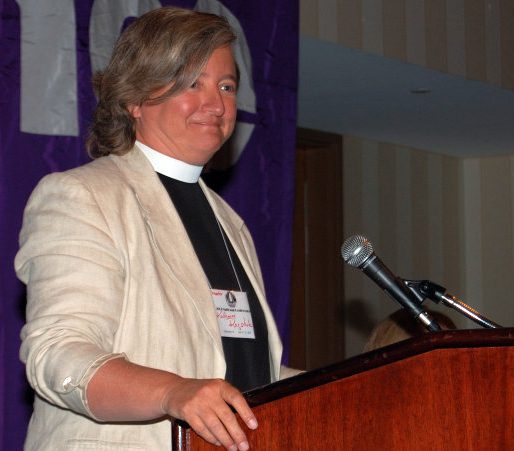Spin Of The Year

Episcopal Divinity School will cease to grant degrees at the end of the upcoming academic year, the seminary’s board of trustees decided July 21 on a 11-4 vote. During the next year, the board will explore options for EDS’s future, some of which were suggested by a specially convened Futures Task Force to make plans for EDS’s future.
“A school that has taken on racism, sexism, heterosexism, and multiple interlocking oppressions is now called to rethink its delivery of theological education in a new and changing world,” said the Very Rev. Gary Hall ’76, chairman of the board, in introducing the resolution. “Ending unsustainable spending is a matter of social justice.”
Translation: “Having abandoned anything to do with orthodox Christianity, we find that we have made ourselves completely irrelevant. If we spin our theological and financial bankruptcy as a sign of our virtue, maybe we won’t look so bad.”
A sampling of courses from the current EDS catalogue:
HB CS 4152 Liberating Bible Interpretations, Antiracist, and White Identity: Approaches to Reading Scripture
What makes an interpretation of the Bible liberating? For whom? When? Where? We will explore how various stages of racial identity development and awareness present challenges to our reading of the texts and each other, in order to develop antiracist and other anti-oppression strategies for preaching and teaching from scripture. Critical Race Theory and Critical White Studies shall inform our primary focus on racial identity of “white” readers while also looking at other culturally dominant features of identity in the interpretive process of biblical texts. G
PT L 1420 Unleashing Our Voices: Voice, Identity, and Leadership
A course for the courageous, who wish to explore first-hand the liberatory [sic] and transformative power of their voices in community. Using the classroom community as a laboratory, the course will combine: (1) practical work on voice production and the body/mind/soul as human instrument with (2) in-class discussion and small team exploration of readings on voice, identity/community membership, and leadership. Voice work will include group exercises for freeing the body and voice, as well as individual work in front of the group using prepared spoken texts and/or sung pieces. Readings will be drawn from writings on the physical voice and voice as an element of social location from womanist, feminist, anti-white supremacist, and other anti-oppression perspectives. Participants will engage questions of voice and power in pastoral, liturgical, theological, educational, and spiritual contexts.
L 3020 Challenging the Liturgical Traditions, Postcolonial, and Queer Perspectives
A critical exploration of intersections between a cluster of contemporary theologies—for example, feminist, queer, postcolonial, “child theology”—and liturgical theology and practice.
T PT 2165 Mission, Ministry, and Sacraments: Re-visioning the Church Inside-Out
This course seeks to construct a theology of the church the essential nature of which is its “inside-turned-outness” for the life of the world. In the light of this basic stance of a church as a people—externally focused and God’s- Reign oriented—a theological re-visioning of the central elements of the church’s sacramental life, worship, wit- ness, and ministry is undertaken. A central question is how we can recover the basic calling of the church to be a sign and instrument of a God-intended “alternative humanity” and an agent of transformation in a world characterized by oppressive, exclusivist, and fragmenting forces. Faith-filled resistance, compassionate solidarity, and creative hope shall serve as significant categories in such a re-visioning. Participants will explore the practical and pastoral implications of such a re-visioning for the empowerment of local congregations as change agents.
T CS 1710 Feminist Theories and Theologizing
This course introduces the student to varieties of feminist and gender theories and theorists, e.g., liberal feminism, radical feminism, Marxist feminism, post-colonial feminism, womanist theorists, and Asian American feminism, in order to provide a theoretical foundation for theologizing on behalf of women. is course fulfills the feminist theory requirement for the MATS student concentrating in FLT. G
T 2010 Contemporary Christologies
Who is Jesus Christ for us today? is course will explore a number of contextual christologies, including the Black Christ, the feminist Christ, the womanist Christ, the Asian Christ, the Asian feminist Christ, the Latina Christ, the queer Christ, and the disabled Christ. is course will also explore the intersections of postcolonial and queer theory with contemporary christological reflection.
T 2160 Third World Feminist Theology
A critical study of the challenges and the contributions of ird World feminist theology to the theological discipline. The works of Mercy Amba Oduyoye, Elsa Tamez, Ivone Gebara, Chung Hyun Kyung, and Mary John Mananzan will be studied. G
T PT 2323 Spirituality of Healing
This course explores the spiritual foundations of healing, including mind and body connections, breaking the cycle of violence, and developing life-affirming spiritual practices. Particular emphasis will be on healing from internalized racism, homophobia, and other forms of structural oppression. There will be opportunities to study Chinese approaches to healing.
Gosh, I cannot imagine why they can’t sustain enough interest among the faithful to stay open. Last year, EDS’s president, an abortion rights activist and lesbian who married her partner at Boston’s Episcopal cathedral, resigned. She once stood outside an abortion clinic and saying that “abortion is a blessing.”
If I were a billionaire, I would buy the EDS buildings in Cambridge, Mass., and turn them over to the Anglican Archbishop of Nigeria. After an exorcism, naturellement.
Subscribe for as little as $5/mo to start commenting on Rod’s blog.